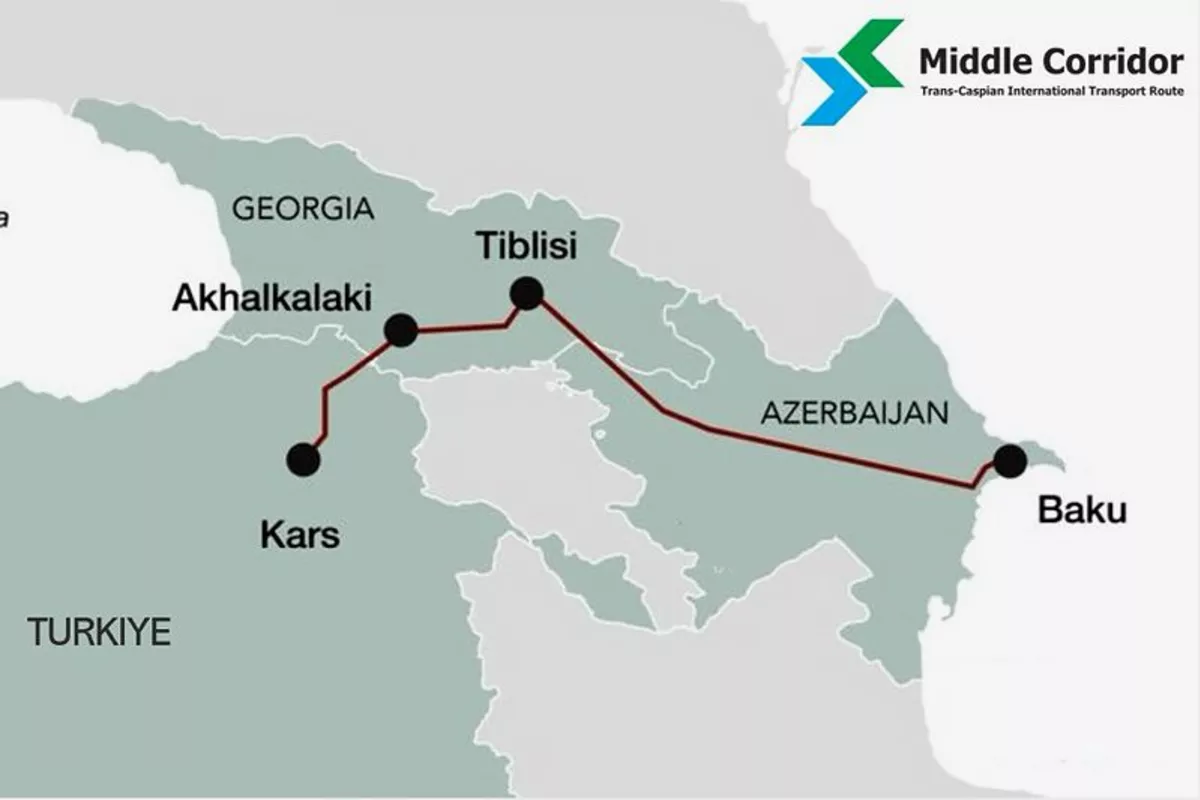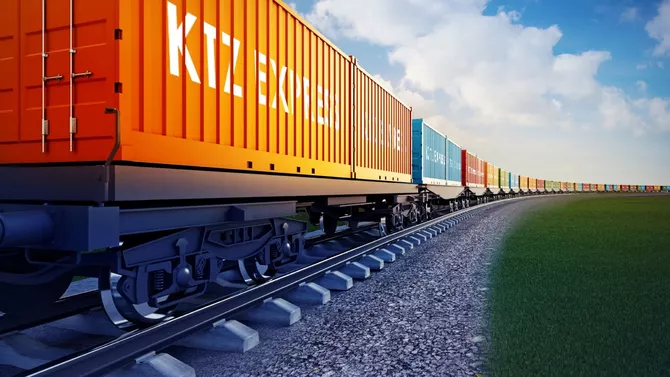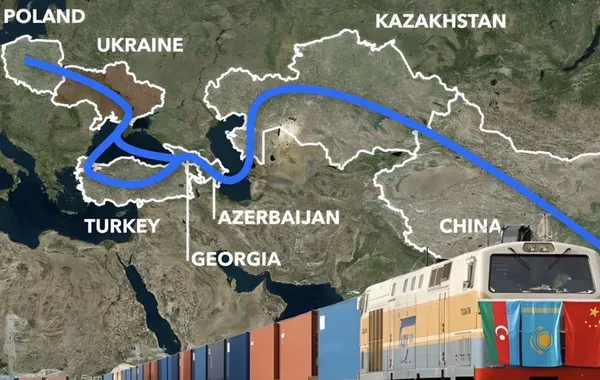
As the Middle Corridor (Trans-Caspian International Transport Route, TITR) continues to develop, the need for the Baku-Tbilisi-Kars (BTK) railway corridor is growing. This route has become a reality despite criticism and negative forecasts.
Recently, Kazakhstan and Türkiye agreed to increase cargo shipments along the BTK railway line. According to Kazakhstan Railways, the relevant agreement was signed by the national railway operators - Kazakhstan Temir Zholy (KTZ) and TCDD Taşımacılık A.Ş. The agreement was concluded during the official visit of Kazakh President Kassym-Jomart Tokayev to Türkiye.
The parties agreed to organize regular rail services between Kazakhstan and Türkiye, as well as to increase the freight capacity between China and Europe/Africa in both directions. In addition, customs and administrative procedures will be simplified to accelerate the cross-border movement of goods.
Particularly noteworthy is China’s increasing focus on BTK. As a key player in the Middle Corridor, China's growing attention to the Trans-Caspian route and BTK is highly significant.
In early July, China Railway (CR) and Azerbaijan Railways CJSC (ADY) signed a memorandum of understanding in Beijing aimed at strengthening cooperation in the development of international transport corridors for freight transportation. The document places special emphasis on the Baku-Tbilisi-Kars route as a key element of the Middle Corridor and foresees increasing transit traffic along this line to 10 trains per day. To achieve this, the parties will cooperate in improving rail and port infrastructure, digitalizing the route, and more. It has also been reported that one of China’s largest container operators - China Railway Container Transport (CRCT) - plans to join the Middle Corridor Multimodal joint venture, which was established in 2023 by the railways of Kazakhstan (KTZ), Georgia (GR), and Azerbaijan (ADY).
Additionally, CR and KTZ signed a new comprehensive strategic cooperation agreement to replace the previous one signed in 2014. The document provides for the implementation of joint projects to develop transport corridors, including the construction of new and modernization of existing railway lines, logistics hubs, and multimodal terminals, as well as the introduction of digital technologies to optimize cross-border operations.

On July 23, KTZ Express - a subsidiary of Kazakhstan Railways - successfully carried out a multimodal transportation of the first container train from Shanxi Province (China) to Azerbaijan via the TITR. According to Kazakhstan Railways, the train was formed at the "Zhongding" logistics center in Jinzhong and consisted of 50 standard containers with photovoltaic module kits weighing over 1,150 tons. The train transited through Kazakhstan and arrived at the port of Aktau, from where the cargo was shipped to Azerbaijan by sea.
KTZ noted that the launch of a new route from northern China via the Middle Corridor demonstrates the growing importance of TITR and strengthens Kazakhstan’s position as a key transit hub in Eurasian logistics.
The expansion of transport and logistics routes is also contributing to the growth of trade between Azerbaijan and China.
According to the State Customs Committee of Azerbaijan, in the first half of 2025, the volume of trade between the two countries amounted to $2.1 billion, an increase of nearly 30% compared to the same period last year. China has now become Azerbaijan’s fourth-largest trading partner. Azerbaijan’s exports to China still lag significantly behind imports - $46.3 million versus $2 billion. However, this $46 million figure represents an increase of more than 4.5 times compared to last year. Chinese exports to Azerbaijan also grew - by nearly 1.5 times.
In the first half of this year, Azerbaijan received 199 block trains from China - more than double the number received in the same period of 2024. A total of 20,000 TEU containers (twenty-foot equivalent units) were transported - again, more than double last year’s figure for the same period.
All of this is the result of well-established logistics and the expansion of transport corridors. Once the modernization and expansion of the BTK line are fully completed, a sharp increase in transit cargo along the China-Europe route is expected.
In April this year, Emil Mammadov, Deputy Chairman of ADY, announced at the Caspian-Central Asia Oil and Logistics Trade Forum in Baku that the BTK could be fully operational by the end of this year. In 2024, ADY carried out capital repairs and reconstruction of the railway track, expanded terminal capacities, and is currently working on attracting dry cargo. The transportation of petroleum products via BTK will begin once the line is fully commissioned.

In any case, the process is expected to be completed by the end of this year. The focus is primarily on the modernization and expansion of the Georgian section of the corridor. Georgian Prime Minister Irakli Kobakhidze told Parliament in a government report that 98.5% of the work on the Georgian section of BTK has been completed. He stated that the railway modernization project is nearing completion.
In fact, reliable and rapid freight transport between Asia and Europe via the Middle Corridor has been in place since BTK was launched in 2017. The only remaining issue was capacity. By the end of this year, that issue is expected to be resolved. The repairs, expansion, and modernization of the Georgian section of BTK will increase the corridor’s throughput fivefold - from 1 to 5 million tons per year.
It is worth recalling that at the end of last year, China’s chargé d’affaires in Azerbaijan, Ding Tao, announced during a press conference summarizing Azerbaijan-China relations in 2024 that China would offer Azerbaijan favorable conditions for transit shipments in 2025.
It appears that China is keeping its word. Beijing’s actions underscore a long-term strategic commitment to the success of the Middle Corridor - not just as an alternative to traditional northern or southern transport routes, but as a core component of China’s broader Belt and Road Initiative. The strengthening of logistics ties between China and Azerbaijan, supported by coordinated efforts with Kazakhstan, Türkiye, and Georgia, marks a major geopolitical and economic shift in Eurasian connectivity.
For Azerbaijan, this deepening cooperation opens the door to becoming a true regional logistics hub, bridging East and West through efficient, multimodal corridors. With freight volumes rising, infrastructure projects nearing completion, and digitalization efforts underway, Baku stands at the crossroads of a new era in transcontinental trade. The BTK railway, once questioned by critics, is now emerging as one of the most vital arteries of the Silk Road of the 21st century.
As the year draws to a close and the final stages of modernization are completed, the Baku-Tbilisi-Kars line - reinforced by Chinese investment and regional cooperation - is poised to unlock a new level of economic integration between Asia and Europe. The Middle Corridor is no longer a vision of the future. It is a reality - and it’s accelerating.
By Tural Heybatov
Share on social media
